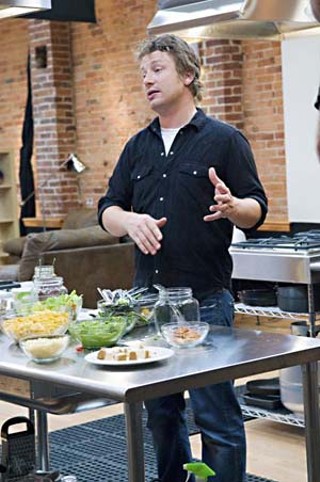TV Eye
Are You Going to Eat That?
By Belinda Acosta, Fri., April 9, 2010

The mostly likeable and superanimated British chef Jamie Oliver, formerly of Food Network fame, has hit U.S. prime-time TV with his new reality series, Jamie Oliver's Food Revolution. His goal? Change the eating patterns of the U.S. one small town at a time. In this six-episode series, Oliver has descended upon the "unhealthiest city in America," Huntington, W.Va., to spread the gospel of good eating. Obesity reigns in Huntington, along with lack of exercise and a dearth of fresh fruits and vegetables on the public school lunch menu (where many of Huntington's schoolchildren, as in places elsewhere in the nation, get their only reliable meal of the day).
In one provocative early episode, Oliver gathered students, teachers, and parents for a show-and-tell to visualize the amount of fat they were consuming in a typical month of school lunches. The miasma of fat and all things nasty was definitely revolting, and the expression on the faces of those assembled showed that Oliver made his point. And then, because this is reality TV and there must always be a sharp focus on something up close and personal, Oliver takes an overweight family to a doctor for a checkup. The verdict: The preteen son of the family could have diabetes. They draw blood. They wait for the results. The portly father has a one-on-one with his portly son. Oliver talks to the mother and tells her she has to change her ways of feeding her family or risk killing her son. The anxious (and yes, portly) mother dissolves into tears. Oliver promises to help. And then, the moment of truth: Junior doesn't have diabetes. Not yet. The mother resolves to do better.
As a person carrying around too many el-bs, I am not going to argue with Oliver. Eating habits in this nation are horrific. But in scaring this mother, he neglects to ask the larger questions. Why, for example, is it cheaper for this mother of a family of four to feed her family on a diet of frozen pizza and soft drinks than on fresh fruits and vegetables? Why is it that the American palate is geared toward the sweet, salty, and fat? How come children, especially in our poorest communities, believe food comes in a box?
Oliver's crusade is not new. Writer Michael Pollan began asking these very questions with his books on the American diet, The Omnivore's Dilemma (2006) and In Defense of Food (2008).
"As eaters we find ourselves increasingly in the grip of a Nutritional Industrial Complex – comprised of well-meaning, if error-prone, scientists and food marketers only too eager to exploit every shift in the nutritional consensus," Pollan writes in In Defense of Food. "Together, and with some crucial help from the government, they have constructed an ideology of nutritionism that, among other things, has convinced us of ... pernicious myths."
There is no room to fully outline Pollan's work here, except to say that when it comes right down to it, it's more profitable to create processed, unhealthy food than food that is good for the American people. When a person of limited means is trying to decide between a bundle of fresh broccoli and a bag of processed food that only requires the addition of a cheap cut of meat or pasta to feed a whole family, what do you think the logical choice is?
It seems to me that if Oliver really wants to start a revolution, he might do better to enlighten his viewers as to how the "Nutritional Industrial Complex" has not only failed the American public but needs to be brought to task, Michael Moore-style, for its role in creating the obesity epidemic we face today. I doubt this will happen on prime-time TV. This does not baffle me. What annoys me is where Oliver's accusing spatula is pointed: squarely at the mother, when in reality it should be pointed elsewhere.
eWaste Drive Time
If it's April, it must be time for another citywide electronic waste drive. You can turn in old computers, cell phones, TVs, and more on Saturday, April 17, from 9am to 3pm at Lot 39 on the University of Texas campus (Red River & Dean Keeton, east of the LBJ Library). For a list of acceptable items, go to sec.engr.utexas.edu/index.cfm/activities/ewaste.
As always, stay tuned.
E-mail Belinda Acosta at tveye@austinchronicle.com.










